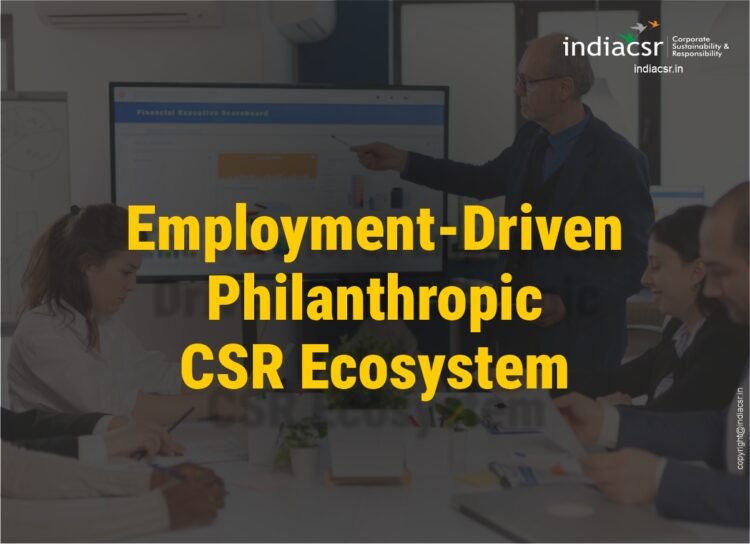
As India envisions itself as a developed nation by 2047 (Viksit Bharat 2047), corporate social responsibility (CSR) and family philanthropy must evolve beyond conventional charity and aid. The future demands an ecosystem where these funds not only drive social change but also create employment opportunities, ensuring self-sufficiency for communities. With India’s social sector funding estimated to touch Rs. 45 lakh crore ($550 billion) by FY 2029, a reallocation towards employment generation could unlock new economic potential.
Projected Growth in Philanthropy and CSR
The recently released India Philanthropy Report 2025 by Bain & Company and Dasra estimates that CSR and family philanthropy could unlock an additional Rs. 50,000-55,000 crore ($6-7 billion) in the next five years.
However, merely increasing donations will not be enough. There is an urgent need to integrate these funds into structured, employment-generating programs that provide sustainable livelihoods and reduce long-term dependency on philanthropy.
*****
The Missing Link: Aligning CSR with Employment and Skill Development
While India has seen significant CSR contributions—reaching Rs. 1.3 lakh crore ($16 billion) in FY 2024—the impact is often diluted due to scattered initiatives lacking strategic direction (India Philanthropy Report 2024).
This report highlights that India’s social sector spending has experienced a robust annual growth of 13% over the past five years, amounting to approximately Rs. 23 lakh crore ($280 billion) in FY 2023, with public spending constituting about 95% of this expenditure.
The key missing link is employment-centric philanthropy, where CSR and family funds invest in skilling, entrepreneurship, and MSME growth to create an economic ripple effect.
Some key areas that demand immediate attention are:
- Skilling and Reskilling Programs:
- India’s working-age population (15-64 years) is expected to reach 1 billion by 2050, making job creation a national priority.
- CSR should actively fund technology-based skill development, AI-driven education, and industry-aligned vocational training.
- Entrepreneurship and MSME Development:
- India has over 63 million MSMEs, yet many struggle due to a lack of funding and support.
- CSR capital must shift towards empowering rural entrepreneurs, providing microfinance, incubation, and business mentorship.
- Green Jobs and Sustainability-Linked Employment:
- With climate change concerns rising, green jobs in renewable energy, sustainable agriculture, and waste management must be prioritized.
- Companies like Tata, Adani, and Reliance are already investing in green infrastructure, but employment-linked CSR programs must scale up further.
- Women-Centric Employment Initiatives:
- 55% of family philanthropy is now led by women, signaling a shift towards gender-inclusive programs.
- Empowering women through entrepreneurship, financial literacy, and self-help groups (SHGs) must be a core focus.
*****
Private Sector’s Role: Family Businesses Leading Employment-Focused Philanthropy
Family-owned businesses contribute 65-70% of private sector CSR funding annually, equating to Rs. 18,000 crore ($2.2 billion). However, only a small fraction of this amount is explicitly directed towards employment generation. Leading family businesses need to shift from traditional CSR models towards impact investments that directly translate into job creation and self-reliance.
Some promising trends in family philanthropy include:
- Growing preference for structured philanthropy: 65% of families now employ dedicated staff for managing giving strategies.
- Rise of the next-gen and inter-gen philanthropists: 33% of family funders now include younger generations who prioritize innovation-driven giving.
- Philanthropy-driven employment programs in emerging sectors: Increasing focus on gender equity, climate action, and digital economy-linked jobs.
*****
Leveraging India’s Diaspora for Employment-Driven Giving
With India’s global diaspora expanding from 18 million in 2019 to 35 million in 2024, the potential for global philanthropy to fund employment programs in India is immense. However, lack of awareness and an underdeveloped philanthropy infrastructure remain major barriers. Setting up structured funds targeting diaspora contributions towards employment, entrepreneurship, and education can bridge this gap.
*****
Strengthening India’s Philanthropy Ecosystem for Viksit Bharat 2047
For CSR and family philanthropy to truly transform India, a robust support infrastructure is needed. Family offices have grown sevenfold—from 45 in 2018 to 300 in 2024—demonstrating a shift towards institutionalized, value-driven giving. The government, private sector, and civil society must work together to:
- Streamline CSR compliance and impact assessment to ensure funds are used efficiently.
- Create platforms that connect philanthropists with grassroots employment initiatives, ensuring funds are directed towards high-impact projects.
- Establish public-private partnerships (PPPs) that align CSR with national job creation goals to scale employment programs.
*****
The Future: CSR as a Driver of Job Creation
For India to achieve its vision of Viksit Bharat 2047, CSR and philanthropy must transition from passive donations to active investments in employment generation. Companies and family philanthropists have the power to reshape India’s socio-economic landscape by prioritizing livelihoods over short-term aid. With strategic allocation and a focus on sustainable job creation, CSR can become a catalyst for economic independence and a self-reliant India.
About the Author
Rusen Kumar is a senior journalist covering CSR, ESG and Sustainability in India. He can be reached at editor@indiacsr.in























